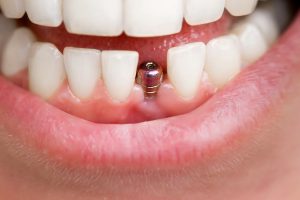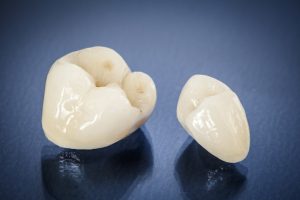Are you worried about your dental implant showing through your gum? You shouldn't be able to see the metal from your implant through your gums or above your gumline.
If you can, this might mean that you have an infection, or that you have pretty severe gum disease. In either case, you should contact your dentist ASAP to treat the issue before it develops into something worse — like implant failure.
In this article, we'll talk about dental implants showing through the gums, how to prevent this, and what you should do if it happens to you.
In This Article
The implant healing process and gum growth
Once you've gotten your implants placed, your mouth will try to begin healing. Implant placement typically has various steps:
- Actual implant placement: The post is placed into your jaw. During the healing process, the bone will integrate with the implant and grow around it.
- Abutment placement: This can happen at the same time as the dental implant placement, but in some cases, a separate procedure is required, in which case it will take a few weeks for the gum tissue to heal around the abutment.
- Crown placement: Once the gums have healed around the abutment, the dental crown is placed.
After you get the implant placed, your gums will grow around it, providing stability, but during this process, your dentist should ensure that the gums don't completely cover the implant. Then once you get the abutment placed, your gums will grow around that as well.

The gums heal around the abutment, and once you have a crown placed, they will also grow around that. Ideally, your implant placement procedure will involve some sort of gum contouring at the end, so that your gums fit around your teeth as naturally as possible.
In some cases, you can get same-day dental implants, which reduces the healing times needed for gums.
Why do dental implants show through gums?
Over time, you may begin to see your dental implants showing through your gums. This can be caused by various issues — gum recession, thinning gums, or peri-implantitis to name a few. Let's have a closer look at those now.
Peri-implantitis
This is an infection that happens around dental implants. This infection can cause the gums to become inflamed, and can also cause a loss in bone density around the implant. If it's not treated in the early stages, the entire implant may need to be taken out, and then it may be too late for dental implants.
Peri-implantitis may be caused by poor oral hygiene or smoking. To avoid it, it's important to speak with your dentist about a long-term maintenance plan regarding your oral health with your new dental implants.
You may experience the following symptoms if you have this infection:
- Bleeding and pus
- Fever
- Swollen and red gums
- Throbbing pain
- Difficulty chewing
- Bad breath
- Loose-feeling implants
If you experience any of these, make sure to contact your dentist immediately.
Gum recession
Just like gum recession can happen with normal teeth, it can happen with your dental implants. While gum recession is never a good look, it can be even more jarring when you have dental implants, because your receding gums won't reveal natural tooth roots, but rather the metal implant posts.
Besides the cosmetic downsides of gum recession, the health effects can be much worse. Gum recession can even result in implant failure, in which case you might need implant removal.
You might experience gum recession with implants due to any of the following:
- Poor oral hygiene
- Smoking
- Tooth grinding
- Malocclusion
- Hormone issues
- Brushing too hard
Preventing gum recession with dental implants
Some things you can do to prevent the dental implant screw from showing through gums from gum recession include addressing teeth grinding by wearing a custom nightguard, practicing better oral hygiene, and quitting smoking.
Thin gums
If your gums are so thin that you can see the implant post through them, this is probably a sign of unhealthy gums. Contact your dentist to find out what you should do to address the problem.
Solutions for dental implant showing through gum
Thankfully there are various solutions to fix dental implant metal showing through gums, and if implemented early enough, they can help you avoid implant failure and other oral health problems. Let's have a look at some of the most common procedures:
Gum grafts

A gum graft is when the gum is taken from another part of your mouth and attached to the place where your gums are receding. The new gum will cover the parts of your implants that have become exposed.
Replacing the crown
Sometimes as your gums change form over the years, the crown is no longer a good fit. In this case, your dentist may recommend creating a new crown that is taller and so meets your gum at your natural gum line.
Redoing the implant
In the worst of cases, you may need to redo the entire implant procedure. This will only be necessary in severe cases of gum recession, or peri-implantitis. Your dentist may recommend mini dental implants as well.
Conclusion
If you notice your dental implant showing through your gums, or a receding gum around implants, not only is this unsightly, but it's an indication that something is wrong — either with your gums, the crown, or the dental implant.
One of the most common reasons you might see the implant through your gum is gum recession. If your gums are receding to the point that your implants are visible, this needs to be addressed as soon as possible, otherwise, it could result in implant failure.
Another cause of seeing the implant through your gums might be an infection called peri-implantitis. This condition also needs to be addressed immediately to avoid the failure of your implant, and the need to redo the process completely.
Most gum issues can be prevented with proper oral hygiene and regular trips to your dentist. If you notice something wrong with your implants or gums, contact your dentist immediately.
FAQs
Should dental implants show through gums?
Dental implants should not show through gums. If they do, it's unsightly and typically indicates other problems, like gum disease or infection related to your dental implants.
Is my dental implant supposed to be exposed?
No, your dental implant is not supposed to be exposed. This is an indication that your gumline has recessed to the point of revealing the implant post. Gum recession could lead to implant failure.
How do gums grow around implants?
Gums grow around implants as part of the healing process. Once you get the implant post placed, your gums will begin to grow around it and help stabilize the implant.
At this point, it's important that your dentist monitors the healing process to ensure that the gums don't completely cover the implant. Your gums will also heal and grow around the abutment, and along the line of your crown, just as they do with normal teeth.
At the end of your procedure, you may get a gum contouring treatment to ensure the most natural look possible.
How do you fix a receding gum implant?
There are various ways you can fix receding gums around your implants. One of the most common ways will be a gum pocket cleaning and a gum graft. A new crown may also be needed.




